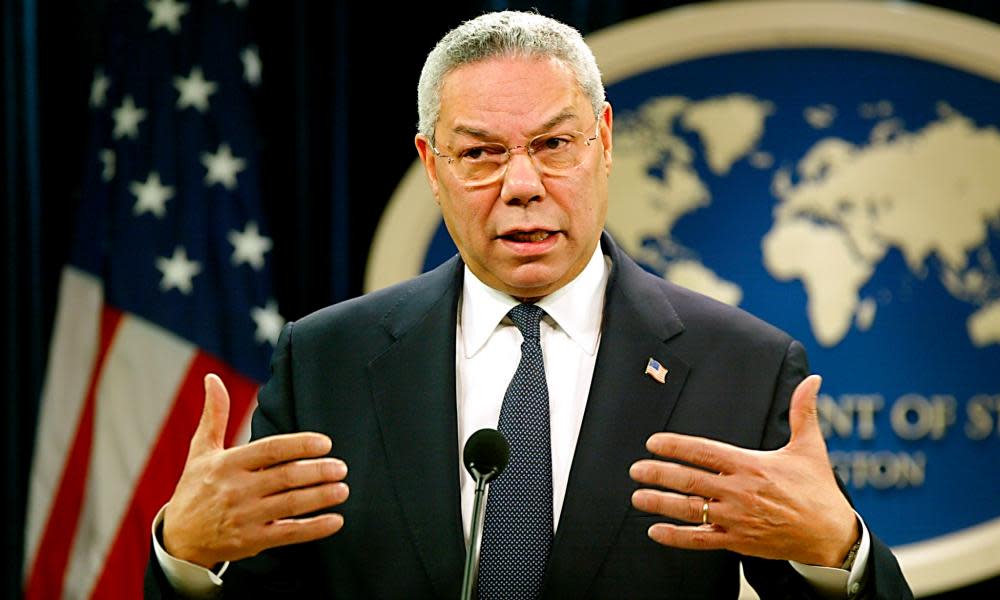‘The court of God will be waiting for him’: Iraqis react to Colin Powell’s death

- Oops!Something went wrong.Please try again later.
For many Iraqis, Colin Powell was the face of the US invasion which caused an estimated 200,000 deaths, unleashing nearly two decades of domestic chaos and precipitating turmoil throughout the region.
His death, at the age of 84, was unlamented by many in a country still grappling with the aftermath of a disastrous occupation and an Islamist insurgency that followed the 2003 war – a conflict that Powell himself was later to acknowledge as a stain on his legacy.
In Iraq’s northern city of Mosul, which bore the brunt of the insurrection by the Islamic State terror group, eulogies for the former general were brusque and often unforgiving.
Related: Colin Powell’s UN speech: a decisive moment in undermining US credibility
“America made Iraq worse because they destroyed the entire country, and they were the reason people from outside Iraq came to control Iraq,” said Khaled Jamal, a resident of the city. “He introduced chaos to Iraq,” he said of Powell whose speech to the UN general assembly laid out the flawed US case for war. “He was an important part of this, because he was the main liar who gave unreliable reasons for America to attack Iraq.”
A second Mosul resident, Suha Mutlak gave a bleak assessment of Powell’s UN speech. “He was the reason my cousins were killed and that my family needed to live in camps for three years,” she said. “What sort of a victory was this? Not for them and not for us.”
Politicians remained largely mute – as did Iraqi media. Social media, on the other hand, lit up with critiques of Powell’s role in making the case to invade.
In the south of Iraq, the US invasion which ousted Saddam Hussein – but left carnage in its wake – is largely seen as a disaster for the country. In the capital, Baghdad, views of the invasion – and Powell’s role – are more mixed.
“We are freer, true. And we can travel and make a living,” said Ayad Abdul Rahman, a local businessman from the Adhamiyah district. “But it took so much pain to get here; was it really worth the suffering? More than 120,000 Iraqi citizens died. Millions more left. It’s good that he reflected on what he did before he died.”
A man who became synonymous with the Iraqi anger towards Powell’s former boss, George W Bush, took to Twitter to offer a eulogy. “I am saddened by the death of Colin Powell without being tried for his crimes in Iraq,” said Muntader al-Zaidi, who in 2008 threw his shoes at Bush at a press conference in Baghdad. “But I am sure that the court of God will be waiting for him.”
His response contrasted with attitudes in the Kurdish north – where some residents said Powell had advanced the cause of Kurds by helping defeat the Iraqi dictator.
The prime minister of Iraq’s Kurdish region, Masrour Barzani was among the first to acknowledge the death of Powell, who died from Covid complications and had recently been treated for blood cancer: “I’m saddened by the passing of former secretary of state Colin Powell, a lifelong friend of the Kurdistan region and Iraq,” Barzani said on Twitter.
“We worked closely together to rid the country of dictatorship. I know he sought lasting peace for the region.”
Another Kurd, Halmat Ghareeb, a lecturer in international law at Salahaddin University, also praised Powell’s role in the country’s history. “He made Iraq a better place. He is always remembered by Kurds and other Iraqis because he was one of the reasons Kurds won an autonomous region in 1991. He was a general at that time and helped lead the American attack of the Iraqi army in Kuwait. That led to our uprising and our [quasi] independence.”
Several Kurds pointed to Powell’s post-invasion visit to the town of Halabja in 2003, where Saddam’s forces shelled Kurdish communities with sarin-laced shells, killing up to 5,000 people, 15 years earlier.
“America was not wrong to invade Iraq,” said Ghareeb. “He will forever stay in the Kurds’ memory.”
Another Kurd, Goran Salam, a researcher, offered a mixed verdict on Powell’s legacy. “He made Iraq better by helping introduce freedom and democracy,” he said. “But at the same time, security was destroyed here. The American presence led to increasing terror activities and was the reason that Isis and al-Qaida appeared in the Middle East.”
Additional reporting by Barzan Salam

